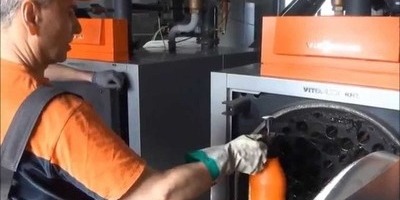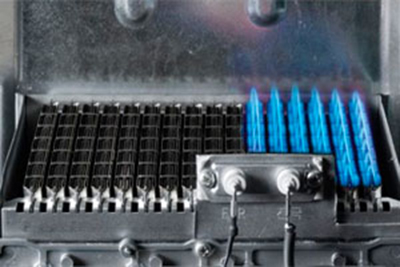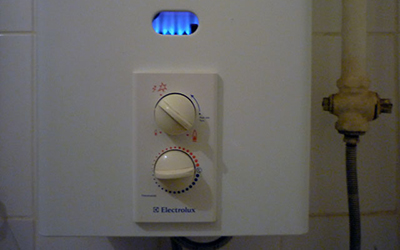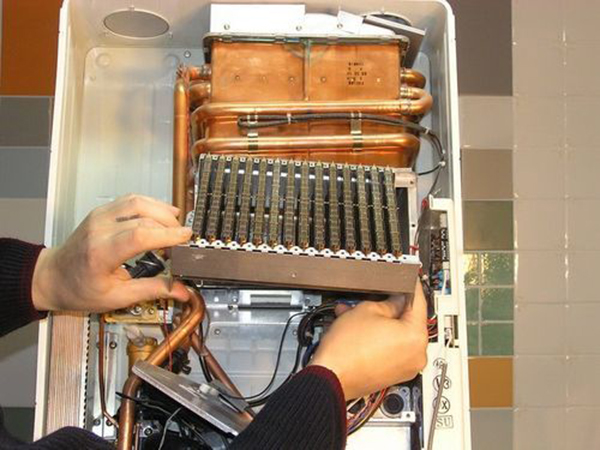Several reasons why a gas boiler clicks and makes noise. How to troubleshoot?

The newly purchased gas boiler heats the room in the same way as silent as an electric kettle.
However, after some time (depending on how you install and configure the boiler) it may tap softly or, on the contrary, hum like a car.
Why does a gas boiler click and how dangerous are these noises?

Knocks, clicks, vibrations or sometimes even an “explosion” in gas boilers occur most often due to dirt and fossil build-up in the heat exchangers hot water or in the main heat exchange heating center.
The clicks or hum themselves do not pose a danger to the residents of the house. No defects or malfunctions will appear because of them.
The most they will bring is discomfort.
Reference! However, clicks (and other noises) usually become indicator of malfunctions in a gas boiler. This could be either a serious breakdown of a part or a build-up of dirt.
Gas boiler clicks when heating, turning on and/or turning off.
During switching on
- In case of malfunction of the three-code valve.

- If you hear a loud bang or knock, then most likely, The ignition system is faulty. This happens when the spark ignites much later than it should.
In this case, a large amount of gas accumulates. When a spark appears, the gas flares up and a pop is heard.
- This type of noise is caused by clogging of the wick (if the gas boiler is semi-automatic) or a defect in the flue gas exhaust. At the same time, the electrodes (in boilers with automatic ignition) become clogged, which short-circuit and click. During heating, they deflect more strongly.
- Clogged nozzles in the burner lead to a poor quality mixture of natural (or liquefied) gas and air. This is evidenced by the noise when lighting a fire.
During the heating process
- The gas boiler makes noise if the radiator mounting brackets are not installed correctly. Then, during heating (sometimes during cooling), the thermal expansion in the heating system will not be balanced.
- Clicking sounds can also be caused by a clogged mesh in the housing. At the same time, the draft decreases when heated.
- Sometimes resonance occurs in the system due to improper operation of the pump.
- The evaporation of a large amount of water is also accompanied by various sounds.
When cooling

Heat needs a lot of space to spread out, and if the pipes are not installed with this in mind, the boiler will likely make clicking or cracking noises.
This phenomenon is most noticeable when cooling the heating device, when the temperature changes to a lower side.
How to get rid of unpleasant sounds?
A good way is – convert an open water supply system to a closed one. Then the water boils a little less, and there will be less noise. Also, such a procedure will additionally protect metal parts from limescale or corrosion.
Attention! Changing the type of systems does not affect its functioning without a pump. Changing the system involves installing air vents and replacing the expansion tank with a membrane tank.
When dirt accumulates, the situation is somewhat different. When limescale forms on the walls of a gas boiler, the temperature inside these walls gradually increases. This, in turn, will lead to a reduction in the service life of the heat exchanger and to the appearance of clicks and knocks.
Important! Not only clicks and knocks are a sign of deposits in the boiler, but also such characteristic sounds as vibration, crackling and "explosions" (in advanced cases).
Only cleaning the gas boiler from limescale will help here. This can be done either independently (don't forget to turn off the heat exchanger) or with the help of a specialist.
To avoid dirt deposits, it is recommended to regularly wash the components. in a 4% vinegar solution. This procedure must be carried out after removing the heat exchanger. The parts must then be washed in clean water.

Photo 1. Disassembling a gas heating boiler and checking components for limescale and mud deposits.
If an important part is seriously damaged, the best option is to call a specialist, because self-replacement can damage the boiler even more. Do not forget that a gas boiler Life-threatening if used incorrectly.
Useful video
From the video you can find out why a gas boiler starts knocking and how to fix the breakdown.
Main causes of clicking
In fact, there are not many reasons for clicking in the boiler. Here are the main ones:
- component failure;
- appearance of lime;
- violation of thermal balance in the boiler.
The rest are variations of these reasons. If you can't determine the reason yourself, it's better to ask for help from specialists. The master will tell you why the gas boiler is cracking, and will eliminate unnecessary sounds. It may be more expensive, but it's still better than risking yourself or the boiler and fixing the problem yourself.





